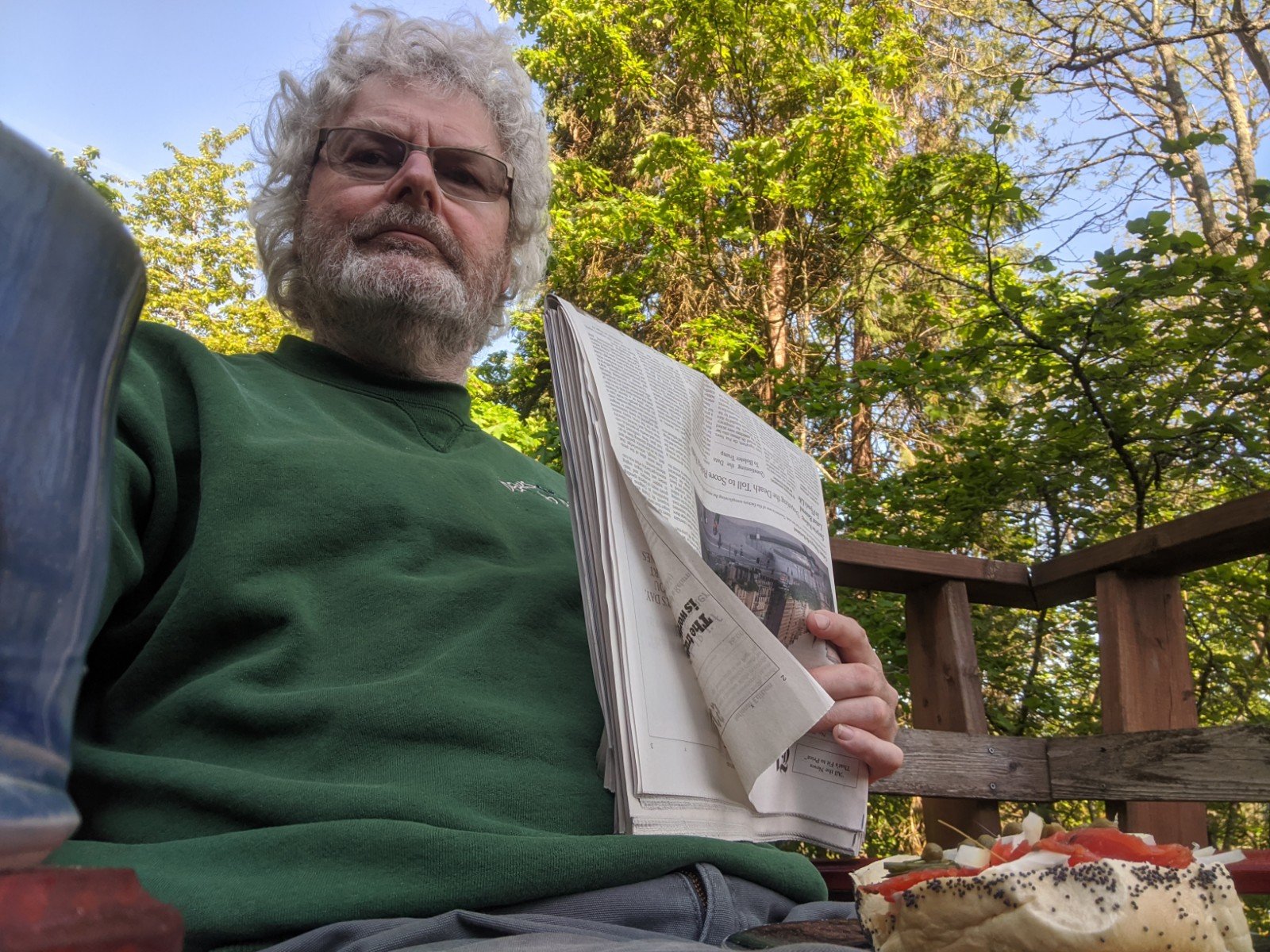




Home made lox, cream cheese, onion, capers on a warm bagel. On the deck with the Sunday Times. This is living.





Home made lox, cream cheese, onion, capers on a warm bagel. On the deck with the Sunday Times. This is living.
To see what a decentralized energy system looked like up close, I made the daylong journey by train to Wildpoldsried, a village of about 2,600 residents that produces about eight times more energy than it consumes, and sells the surplus back to the grid. “I always try to tell people that we are a totally normal village, but nobody believes me.” Günter Mögele, Wildpoldsried deputy mayor“I always try to tell people that we are a totally normal village, but nobody believes me,” said Günter Mögele, a high school teacher who has served as deputy mayor since the late-1990s.Renewable energy can be seen from almost every vantage point in the village, with solar panels fastened to clay-tile roofs and wind turbines in the distance. What I found most remarkable about Wildpoldsried wasn’t how extensively renewable energy was relied on, but what leaders chose to do with the financial proceeds. By selling electricity to the grid, the village gave itself a new income source and improved the lives of residents, offsetting most of the costs for preschool, child care, sports and community theater.
Source: What Germany’s energy revolution can teach the US | The World from PRX
Huh. We could do this. We have extensive land, the tech (viz the solar array at Greenbank Farm), the state subsidies.
Good detail about the early days, when there wasn’t any obvious problem. More evidence that the US has and had systems, people and institutions that are designed for this situation, but that have not been deployed intelligently.
In the US, I discovered, the public health system for historical reasons is a bottom-up organization, where the authority lies with local and state departments. The Federal public health institutions, while being the best-funded, have no authority, they can only recommend. Hence the great disparity in how all this has gone down over the past few months.
Mitch McConnell suggests that states go bankrupt rather than looking for money from the Federal government, despite the latter’s ability to borrow at negative interest rates and the former’s legal requirement to maintain balanced budgets. I have a counter-suggestion: let states stop making their federal tax payments. If the Feds won’t fund the states, then let the states stop funding the Feds. States can use that money to fund essential services instead.
McConnell and others talk about “borrowing from future generations”. How about we just reverse those tax cuts the Feds have instigated over the last 20 years, and put that money to work? Progressives need to stop talking about incremental taxes on the very rich and instead talk about how much money we would have taken in for the last couple of decades without the tax cuts, and how much we’ve actually taken in, and suggest bringing things back to the “old” normal. Hey, while we’re at it: let’s make it retroactive. If they need me to pay back the check they sent me in the mid-oughts, I’d be happy to write a check for $200.
COVID-19 Superspreader Events in 28 Countries: Critical Patterns and Lessons https://quillette.com/2020/04/23/covid-19-superspreader-events-in-28-countries-critical-patterns-and-lessons/
By surveying the publicly-available information about super-spreader events, he is determining the major mode of transmission of the virus; large droplets with ballistic behavior, small droplets that form clouds or virus on surfaces. His conclusion, with lots of caveats about the quality of the underlying data, is the first: “Flügge” droplets that when expectorated are mostly affected by gravity. As he says, this has implications for the preventative mechanisms we use, some of which actually act to increase the likelihood of the spread of the disease.
This work should be taken up by others. Good stuff.
By Colin Woodard. One of the most persuasive descriptions I’ve read of why the US works (or doesn’t work) the way it does. The theory is that the country was, and is, composed of distinct nations that are often in opposition, politically, culturally and otherwise. Like the Kurds in Iraq, Syria and Turkey, these nations were distinct groups that coexist in a given geography.
Three Westchester county residents accuse WHO of failing to monitor China’s response and covering up outbreak
— Read on www.theguardian.com/world/2020/apr/20/new-york-who-lawsuit-china-coronavirus
That’s what this reminds me of. Why do we have people fighting with each other, instead of pulling together?
A flurry of a breeze tonight, and the cherry blossoms are floating on the wind like snow. Beautiful time to be here.
Vi Hart, a mathematician I follow, has posted a note about the work she and a slew of others have been doing to come up with a nonpartisan, practical plan to get us going after we “flatten the curve”.
It’s remarkably playful for such an important topic, so if you’d rather see the serious plan and all the supporting documentation (and it really is the best, most well-thought-out plan I’ve seen for the US to date), go here instead:
https://www.pandemictesting.org/
I intend to circulate this amongst my local representatives, so they have more than one handle on how to proceed.
“The $2 trillion was enough to pay all wages in the U.S. economy for three months (or longer, if we paid a proportion) and hire the unemployed for a full year at living wages.”
From the MarketWatch article. Wow, what happened to the neoliberals?
https://www.marketwatch.com/story/the-post-pandemic-economy-airlines-are-treated-as-utilities-banks-serve-the-people-and-the-government-runs-a-jobs-program-2020-04-17